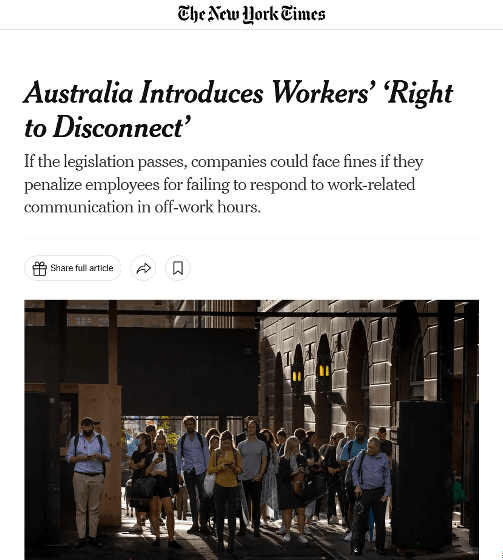Australian Parliament passes a bill giving employees the ``right to be disconnected'' to ignore their boss' emails outside of working hours

Some of you may have had the experience of spending your free time after finishing your day's work, only to receive a work-related email or message from your boss, and replying in disgust. In recent years, legislation has been underway in some countries to provide the right to be disconnected, which allows
Australia Introduces the 'Right To Disconnect' For Workers - The New York Times
https://www.nytimes.com/2024/02/08/world/australia/right-to-disconnect-law.html

Workers win the right to disconnect - Australian Unions
https://www.australianunions.org.au/2024/02/09/workers-win-the-right-to-disconnect/
Employers could face criminal penalties for contacting employees out of hours after right-to-disconnect laws pass - ABC News
https://www.abc.net.au/news/2024-02-09/ir-laws-employers-could-face-criminal-penalties/103445984
Australia passes Right To Disconnect law • The Register
https://www.theregister.com/2024/02/12/australia_right_to_disconnect_law/
In the past, workers were required to work only during the hours they were at the company or workplace, and were often relieved from work once they left the office and went home. However, as technology advances, it has become easier to stay in touch after leaving the office via cell phone, email, and messaging tools, and an increasing number of people are now required to respond to work-related communications even outside of working hours. This trend is also accelerated by the blurring of boundaries between work and personal life due to the spread of telecommuting, with more workers becoming connected to their workplaces virtually every waking moment.
Emails sent outside of working hours have been shown to cause significant stress and fatigue to employees, and in recent years some countries have enacted ``right to disconnect'' laws that allow workers to ignore communications outside of working hours. It's progressing.
Meanwhile, in February 2024, the Upper House of the Australian Parliament passed a bill that protects workers' right to ignore calls and emails outside of working hours. The bill would allow Australian workers to opt out of 'unreasonable' communications outside of working hours, and would protect employers from fines if they punish employees for exercising their right not to be connected. There is a possibility that

Australian Unions recognizes the right to disconnect, pointing out that 79% of full-time workers in Australia have worked overtime, equating to 280 hours of unpaid work a year. We welcome the new bill. Australian Unions says employees can apply to the Fair Work Commission for a ruling if a dispute arises over their refusal to be contacted outside of working hours.
Meanwhile, business groups and conservative opposition parties have criticized the new bill as being hasty and putting businesses at a disadvantage. Brann Black , chief executive of the Business Council of Australia, commented: ``This bill will place a huge burden on businesses and result in fewer jobs and opportunities.'' Opposition Liberal Party senator Michaelia Cash said: 'The bill does nothing to improve productivity, employment, growth or investment, which are essential to economic success. 'We are receiving legal protection,' he said.
The bill is expected to be passed by the House of Representatives (House of Representatives) soon, but the Australian government plans to revise provisions such as imposing criminal penalties on bosses who send emails. Bill Shorten , the government services minister, said he had tried to abolish criminal penalties for employers before the bill was passed by the House of Lords, but he had not received support from opposition parties. 'It's like saying we're just trying to prevent improvements in workers' rights and we're not interested in solving other problems,' he said, adding that it would be a mistake to amend the bill before it becomes law in six months. I explained that there was no.

Related Posts:
in Note, Posted by log1h_ik







